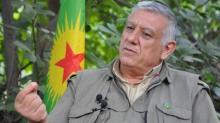Abdullah Öcalan
Turkey's fight with the PKK is heading toward an end
A statement to German TV channels made on April 9 by Cemil Bay?k, one of military leaders of the outlawed Kurdistan Workers? Party (PKK), could prove to be the strongest response to imprisoned leader Abdullah Öcalan?s March 21 call to end the armed campaign launched against Turkey in 1984, in which more than 40,000 people have been killed to date.
PKK apologizes to Germany for violent acts in 90s
A senior leader of the outlawed Kurdistan Workers' Party (PKK) has extended his apology to Germany for the organization's violent actions in the country during the 1990s, adding they did not want to fight with Turkey anymore.
- Read more about PKK apologizes to Germany for violent acts in 90s
- Log in to post comments
Candidate lists in Ankara herald big challenges
Turkish political parties apparently took great pains while selecting their candidates in metropolitan cities such as Ankara, based on the lists they submitted to the Supreme Election Board (YSK) for the June 7 parliamentary elections.
- Read more about Candidate lists in Ankara herald big challenges
- Log in to post comments
Demirta? says HDP is safety valve of peace process
The fate of the Kurdish peace process depends on the election success of his party in the June 7 parliamentary election, Peoples? Democratic Party (HDP) Co-chair Selahattin Demirta? has said, citing his party?s success as a potential facilitator in the laying down of arms by the outlawed Kurdistan Workers? Party (PKK).
- Read more about Demirta? says HDP is safety valve of peace process
- Log in to post comments
HDP will not facilitate presidency: Demirta?
The outlawed Kurdistan Workers? Party?s (PKK) jailed leader Abdullah Öcalan and the Peoples? Democratic Party (HDP) reject the presidential system, the latter?s co-chair Selahattin Demirta? has said, stressing that such a move would mean putting all the fruits of the Kurdish movement?s labor at the service of President Recep Tayyip Erdo?an.
- Read more about HDP will not facilitate presidency: Demirta?
- Log in to post comments
Senior PKK leader says organization can end armed struggle with steps from gov't
A senior leader of the outlawed Kurdistan Workers? Party (PKK) has said the group aims to solve the Kurdish issue politically rather than militarily, and is waiting for ?solid steps? from the government in order to end the armed struggle.
KRG PM Barzani supports peace bid during HDP delegation visit
Kurdistan Regional Government (KRG) Prime Minister Nechirvan Barzani has voiced his support for Turkey's ongoing Kurdish peace process, speaking after a meeting with a visiting delegation from the Peoples' Democratic Party (HDP) in Arbil on March 30.
"We have supported peace and its process since the beginning and we are ready to do our part," Barzani said.
PKK not a separatist or nationalist group: Senior member
Zübeyir Aydar, a leading figure in the outlawed Kurdistan Workers' Party (PKK) based in Brussels, has claimed that the PKK is neither a separatist nor a nationalist organization, while also stressing that the group fully supports the jailed PKK leader Abdullah Öcalan's stance in the ongoing peace process.
Erdo?an's message: Presidential system or no deal
The recent Newroz declaration of the jailed Kurdistan Workers? Party (PKK) leader Abdullah Öcalan contained many ambiguities, but it could still be considered a positive step on the path of the so-called ?peace negotiations.?
- Read more about Erdo?an's message: Presidential system or no deal
- Log in to post comments
Erdo?an's big poker game
It was different in Diyarbak?r for Nevruz this time. Three long years had passed since the first letter was read in the big Ba?lar Square. Those sentences were still fresh in the memories of the Kurdish youth.
- Read more about Erdo?an's big poker game
- Log in to post comments







